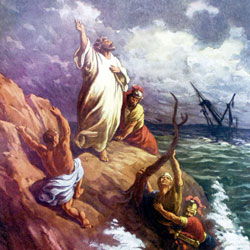So PJ Media reports this happened in Texas earlier in the month:
A pastor made a scene on Friday by preaching about the falsehood of Santa Claus at a mall. He walked around the Santa exhibit, where kids and parents stood in line to see Santa, shouting that Santa isn’t real and that Christmas is about Jesus Christ.
You can watch the pastor make a fool of himself at the link, which includes a Youtube clip the pastor himself filmed.
I’m reminded of the wisdom of the Catholic Church’s repeated insistence that parents are the primary educators of their children, and everyone else, including ecclesiastics, must defer to them:
- The Catechism calls the rights of parents “primordial and inalienable.”
- In Familiaris Consortio, St John Paul II called parents’ ministry “original and irreplaceable.”
- St Thomas Aquinas compares parents’ duty and right to teach their children to the duties and rights of the priest:
“Some only propagate and guard spiritual life by a spiritual ministry: this is the role of the sacrament of Orders; others do this for both corporal and spiritual life, and this is brought about by the sacrament of marriage, by which a man and a woman join in order to beget offspring and bring them up to worship God.”
Hence I’m in pretty good company calling the Texan pastor’s actions out of order. He has no business subverting the rights of parents.
Apart from that, it’s far from clear that he’s right to decry the Santa Claus myth. The author of the PJ Media item linked above relates the Christian origins of gift-giving from St Nicholas. And even the modern Coca-Cola adulteration of St Nick does a lot of good.
Case in point: Eric Schmitt-Matzen’s apostolate, borne from a chance conversation at his local church, and an uncanny likeness to the real deal.
Put me down as a believer.






I agree that parents are the primary educators in this area, but they are making a grave mistake if they lie to their kids about Santa Claus. No amount of historical connections to real people or good messages make up for the fact that it isn’t true.
The whole Santa conspiracy (which is exactly what it is from the children’s perspective) is just a big life lesson in scepticism: “Don’t trust any authority or stories that seem too good to be true.” I am convinced that kids put Santa and God in the same category, and there is a high chance that they will be effectively thrown out together.
Even if we doubt or disagree on the effects, as Catholics we have moral teachings to guide us. We believe lying is wrong. I have never seen any moral argument for why Santa Claus is an exception, other than “we are conveying deeper truths.” This is an “ends justify the means” argument, plus these “deeper truths” are highly questionable.
If there are moral arguments out there, I would be happy to learn them, but from what I can tell, the main justification is “if it feels good it can’t be bad,” which is not Catholic thinking.
Fair play Steve. I hadn’t thought of this much before, only ever as far as finding it mildly amusing that we have legitimised lying to children!
I often get told in the lead up to the big day that “Christmas is for the kids”. Some have admitted to me themselves that once they stopped believing in Santa, it lost it’s appeal from there. God help us.
Interesting discussion which I know I am entering rather late, but anyway… My first reaction is to defend Santa Claus and I could be blinded by that prejudice, but here are my thoughts:
I thought immediately of the celebrated editorial letter to young Virginia which can be found at the following link: http://www.newseum.org/exhibits/online/yes-virginia/
It is very brief and well worth the read if you’re not familiar with it already, both as a response to this question and for its own literary charm. As an aside, it is another reminder how much newspapers and journalism have deteriorated to their now pathetic state.
The issue is not cut and dry, but I would propose perhaps to consider Santa as a sort of ‘myth’ in the technical sense which we would use in relation to scriptural myths, for example. The point isn’t historical truth in a literalist sense, but to convey some greater truths. The literary form of myth is not an evil means being justified by a good end, the means itself is acceptable.
Also, Fr Pat used to distinguish between imagination and fantasy: “Imagination leads us deeper into reality, whereas fantasy leads us away from it.” I would see the Santa Claus myth as an innocent if not positive use of childish imagination.
It’s hard to witness the consumerist corruption that we are seeing more and more as well as people who are more excited about Santa than the Birth of the Saviour of the World that Fr Joel mentions, but I think these are separate issues and our fight needn’t be with Santa Clause.
Greetings old friend! The employing of myth to convey truth is not only justifiable but indeed a good thing. I just wonder what moral truth is going to be taught by the notion of an overweight old man giving away material goods to children who don’t really need them? I suppose to follow Uncle Pat’s lead, does it lend itself to healthy imagination or covetous fantasy? The cynic in me sees it playing all too well into the hands of those who seek only commercial gain.
Devotion to St Nicholas would be nice, or perhaps an elevation of the feast of the Epiphany by Christians bestowing gifts on January 6, or whenever it falls.